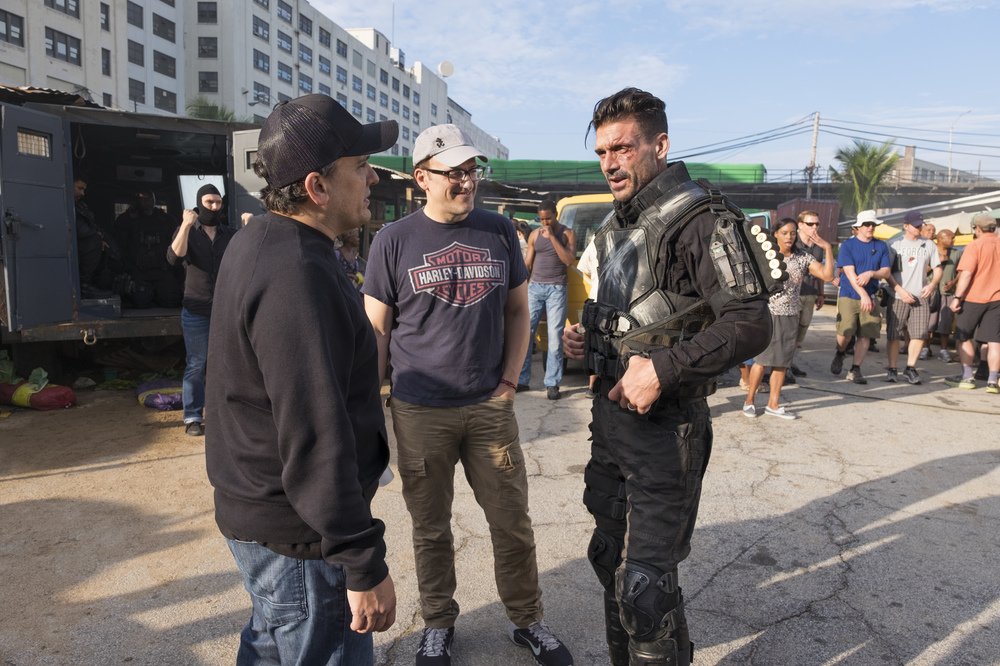 For characters like Black Panther and Spider-Man, who’ll get their own solo films directed by Ryan Coogler and Jon Watts, where does the question of authorship fall in terms of casting and development?
For characters like Black Panther and Spider-Man, who’ll get their own solo films directed by Ryan Coogler and Jon Watts, where does the question of authorship fall in terms of casting and development?
Anthony: Marvel has this focus on the individual movie. You can’t get too ahead of yourself. You can think about where you’re going down the line and can have ideas about it, so you keep in a vague zone of [where you’re going]. But you are going to hurt the individual movie if it isn’t all about that movie at that moment. So when we cast Spider-Man, it was all about ‘Civil War.’ Of course, there were ideas about where he was going, but it was “what do we need to make this character work best in this movie?”
Same thing with Panther: he’ll have his own standalone film, and I’m sure Ryan will make an awesome movie. All it was about for us was “what is Panther doing in this movie?” How do we introduce him in this film, and what are the needs for this particular movie? How do we service that best as storytellers?

Joe: I think the audience is open to it in the same way when they read comic books and different writers deal with different characters. We have a very different interpretation of Captain America than Joss does. His interpretation of him in ‘Ultron’ is very different from our interpretation in ‘The Winter Soldier.’ I think that’s what makes it exciting and keeps the material different, fluid and surprising.
Anthony: Like Joe said, there’s a precedent for that in the comics themselves. There are various iterations of who these characters are, and storylines do end and pick up in ways that allow each expression to be original, fun and not over-burdened with the history.
Are you shooting all of ‘Infinity War’ on IMAX?
Joe: Exclusively on IMAX. We used the IMAX cameras for the 17-minute airport sequence in this movie. We have a lot of characters with a real verticality —these are not people who are bound to the earth. Even moreso than that airport sequence, ‘Infinity War,’ is dealing with characters who have real verticality. Thanos is a very large character in stature. There are other characters like him, because it’s very cosmic. We’re always driven by the storytelling —what is the story we want to tell? We need that verticality for the the scope of what we want those movies to be. We’re fortunate that IMAX is healthy: it’s a format that fans love and it happens to work great for our storytelling.
Anthony: To be clear, you’ll be able to see the film in any theater. But if you are in an IMAX theater, you’ll see the entire movie from beginning to end in the IMAX screen dimensions.

You’d been attached to a “Ghostbusters” movie not too long ago. What happened there?
Joe: Very early on, we were almost identically engaged at the same time Paul Feig was, but on two very different tracks. We were developing an idea with Channing [Tatum] and his company. Two things happened. One is that Paul closed his deal before we did, so it became his universe. Secondly, we closed a deal on ‘Infinity War,’ so we no longer had the option to work on anything until 2019. So we are no longer involved with the project, and the ‘Ghostbusters’ universe that exists is the Paul-authored one.
Do you still have a deal with Sony at this point?
Joe: We have a producing deal with them.
Anthony: Which was actually very helpful in the idea of sharing Spider-Man. That was all going on at the same time as well.
And is “The Gray Man” gone?
Joe: The same thing happened there. We wrote the script, then had to step off the project. I believe Christopher McQuarrie has stepped in.
“Captain America: Civil War” opens on May 6th.





